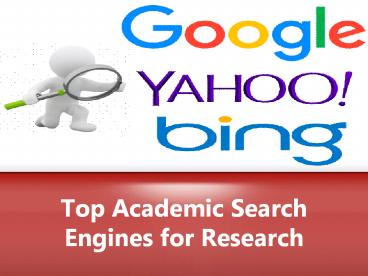Top Academic Search Engines for Research - PowerPoint PPT Presentation
Title:
Top Academic Search Engines for Research
Description:
The academic search engine provides search results by localizing the scientific results required by the user. There are various types of search engines with different characteristics. – PowerPoint PPT presentation
Number of Views:403
Title: Top Academic Search Engines for Research
1
Top Academic Search Engines for Research
2
What is Academic Search Engine?
- The academic search engine provides search
results by localizing the scientific results
required by the user. There are various types of
search engines with different characteristics.
The engines are preferred based on the required
results. Through the academic search engine,
users can access various journals, blogs, and
magazines relevant to their input queries. For a
long time, the academic search engines are
assisting manuscript writers, researchers, and
scholars. It also helps in reviewing the latest
technologies and researches in the concerned
field.
3
How Searching Through General Search Engine and
Academic Search Engine Different?
4
- While general search engine searches from the
whole of the database that includes both relevant
and irrelevant articles while academic search
engine only searched through predefined journals,
reviews, and abstracts. - General search engines do not provide the quality
and standard of results while many academic
search engines have the option for determining
the quality of the research.
5
- It is difficult to narrow the results on a
general search engine in context to a topic while
it is relatively easier in the academic search
engine. - The search results of general search engines are
not organized and lack advanced search options
that are available in almost all academic search
engines. - The databases available in academic search
engines are further subdivided into the
specialized database, a facility that is not
available in general search engines.
6
Why Academic Search Engines are Required?
- Organized data The data is indexed and organized
in the academic search engine. This helps the
researchers to avoid irrelevant information. The
data is structured based on relevance and
according to the most common search criteria. - Authentic articles Most search engines provide
authentic and reliable research articles. Many of
the search engines have access to various
libraries that feed them with relevant and
high-quality articles.
7
- Quality reviewed Many search engines have their
quality control team that assigns the quality
grade to articles. This is of immense importance
as many-a-time, the researchers require the
articles published in journals with high impact
factors. - Easy access As compared to a general search
engine, the user experience in searching the
research articles is favorable in academic search
engines. For instance, if a researcher searches
an article about a disease or drug, the general
search engine provides both relevant and
irrelevant articles.
8
What are the Various Types of Academic Search
Engines?
- Google Scholar Google Scholar, a product from
Google, provides millions of relevant articles,
books, thesis, and dissertations. Millions of
documents are available in the Google scholar
database. On entering the query, Google provides
the results from various websites, universities,
pharmaceutical societies, and journals. - Microsoft Academic Search Microsoft operates
Microsoft academic research. It has millions of
publications in its database. Apart from
delivering thousands of articles for a single
search query, this search engine also analyses
data and present it in the form of graphs and
charts.
9
- CORE CORE has hundreds and thousands of research
articles. It collects data from institutions,
open access journals, and repositories. CORE has
found its importance in plagiarism detection,
literature-based discovery, finding subject
experts, and research impact evaluation. - BASE The BASE is a powerful academic search
engine with more than 150 million documents
obtained from more than 7000 sources. Bielefeld
University Library operates BASE. Almost 60 of
the indexed articles can be accessed in full
texts.
10
- CIteSeerX With a vision to improve the
dissemination of scientific information among
scholars and researchers, the search engine
mostly provides the freely accessible article.
CIteSeerX provides data for non-commercial
purposes. - Semantic Scholar Allen Institute for Artificial
Intelligence developed semantic scholar and made
it public in 2015. It incorporates the use of
Artificial Intelligence to provide an optimum
user experience. The number of papers in this
search engine is more than 179 million.
11
- Science.gov Science.gov provides free results
related to technical and scientific information.
It has over 200 million pages, with searching
access to over 60 databases and 2200 websites. No
registration is required to access the
information and is designed for scholars,
researchers, students, entrepreneurs, and
teachers.
12
Email ID project_at_cognibrain.com Phone
044-49595223 Visit us https//www.cognibrain.com
/































